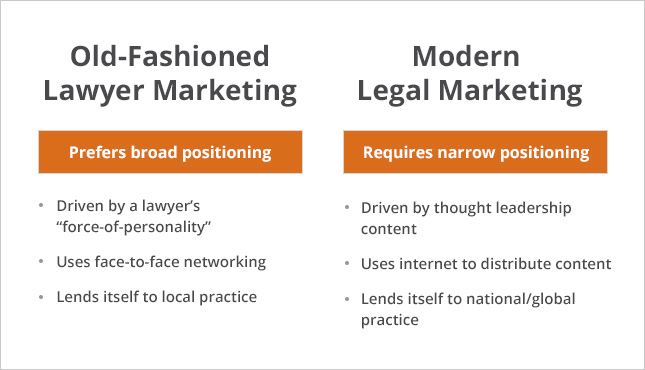As we discussed in a previous post, a well-positioned firm—one that occupies a distinct place in the minds of buyers—has many marketing advantages over its competitors. However, even under the best of circumstances, the market positioning of a law firm (as a whole) is unlikely to directly drive sales.
Why? Because clients don’t hire “the firm.” Rather, clients typically hire individual attorneys (or groups of attorneys) to solve a specific business problem. For this reason, market positioning is even more valuable for attorneys than for the firm itself.
The Modern Marketplace for Lawyers
If you’re a lawyer in today’s global legal marketplace, clear positioning is no longer optional—it’s a requirement for success. In the internet era, the most lucrative work goes to lawyers that can demonstrate specialized expertise (i.e., those with narrow positioning), even if they are geographically distant from the client.
The value of having narrow positioning hasn’t always been so clear. Until recently, most lawyers developed business locally, often over dinner and drinks. Their goal was to build a referral network of local businesspeople, and they preferred to be broadly positioned because they wanted to be offered whatever business their network might generate.
As the internet has transformed the business landscape, this marketing paradigm has fallen out of favor. This is because broad positioning and face-to-face marketing are no longer considered a viable formula for developing an elite and lucrative practice.

A New Lawyer Marketing Paradigm
The modern, internet-driven marketplace has brought a new marketing paradigm for lawyers. This approach assumes that lawyers are not bound by geography, but rather are ready to serve the best clients, no matter where they are located.
The modern legal marketing paradigm has three key requirements for success:
1. Narrow Positioning
Narrow positioning is the cornerstone of the modern marketing paradigm for lawyers. For marketing to be effective in today’s business landscape, an attorney needs to be positioned as an expert in a niche of the law.
The bio below indicates a well-positioned attorney. The highlighted headline makes it clear that this attorney is an expert in hazardous waste regulatory law.

Succinct, narrow positioning (like this attorney’s) is tailor-made for today’s global business landscape. It’s easy to imagine that, with such clear positioning, an attorney like this one is often hired without ever meeting his clients face-to-face.
2. Substantiating Content
Any business’s market positioning rings hollow without sufficient substantiation, and lawyers are no exception. If you declare yourself to be a leading expert in a niche, it’s vital to support that positioning with material such as publications you’ve written or case studies of your past work.
Substantiation requires significant time and effort to develop the kind of material that illustrates knowledge and demonstrates that you have a head start in solving your prospective client’s problems.
Here are a few examples of how an attorney (or group of attorneys) could substantiate their positioning:
- Proprietary Data. One way to distinguish your practice is to share original research that contains valuable, actionable data that clients want. For example, a report on the probability of various legal outcomes, or a database that demystifies a web of overlapping state and local laws.
- Proprietary Methodology. Perhaps you’ve figured out a way to produce better results at a fraction of the customary price. Or you have a specially trained overseas back office that can inexpensively handle technically rigorous tasks that your competitors bill out at a much higher rate than you do.
- Compelling Thought Leadership. Articles and blog posts are a great way to substantiate your positioning. Ideally, these pieces should address big issues that are just emerging in your target market. It also helps if your insight and advice are so novel and compelling as to clearly demonstrate your team’s formidable skills.
3. Internet Distribution of Content
Attorneys (or practice groups) need to get their substantiating content in front of their prospective clients. In today’s world, that primarily happens on the internet, in two ways:
- Via social media channels.
- By making it easily accessible on the firm’s website.
The best way to accomplish the latter is to make the substantiating content accessible right from the attorney's bio (or practice area section or industry group page). An attorney’s bio would ideally be a complete repository of their substantiating content, including items like blog posts, podcasts, and video that are too often relegated to satellite websites. Here are examples of how you can make that happen:
- Integrated Blog – The integrated blog features of this website allow visitors to read the full text of an attorney’s blog posts without leaving their bio.

- Social Media Feeds – An integrated Twitter feed makes it easy for visitors to see what this attorney is thinking about and sharing, without leaving his bio.

- Content Teasers – Sidebar widgets and teasers can be used to draw attention to an attorney’s (or practice’s) newest and best substantiating content.

- Bio Sub-pages – Supporting sub-pages within a bio can help demonstrate an attorney’s specialized expertise.

These examples show attorneys that have positioned themselves as experts in a clearly defined area of law and have substantiated their positioning with a deep repository of content. This is modern legal marketing in a nutshell.
Messaging Nirvana
In an ideal world, the market positioning of each attorney (and practice area) would support the positioning of the entire firm. For example, if the firm’s positioning were, “The Global Leaders in Business Litigation,” then each of the firm’s attorney's would demonstrate expertise that relates to business litigation.
A firm that could achieve this level of messaging harmony would have a tremendous marketing advantage over its competition. This would be “messaging nirvana.”
Fortunately, messaging nirvana is not essential for business development success. Rather, the positioning of the firm’s attorneys and business units is far more crucial. Clients hire individual attorneys and groups of attorneys—so by focusing on this level, law firm marketers can have the greatest impact on the firm’s bottom line.